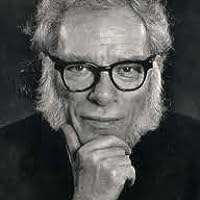Fallacy Quotes
Quotes tagged as "fallacy"
Showing 1-30 of 78

“A number of years ago, when I was a freshly-appointed instructor, I met, for the first time, a certain eminent historian of science. At the time I could only regard him with tolerant condescension.
I was sorry of the man who, it seemed to me, was forced to hover about the edges of science. He was compelled to shiver endlessly in the outskirts, getting only feeble warmth from the distant sun of science- in-progress; while I, just beginning my research, was bathed in the heady liquid heat up at the very center of the glow.
In a lifetime of being wrong at many a point, I was never more wrong. It was I, not he, who was wandering in the periphery. It was he, not I, who lived in the blaze.
I had fallen victim to the fallacy of the 'growing edge;' the belief that only the very frontier of scientific advance counted; that everything that had been left behind by that advance was faded and dead.
But is that true? Because a tree in spring buds and comes greenly into leaf, are those leaves therefore the tree? If the newborn twigs and their leaves were all that existed, they would form a vague halo of green suspended in mid-air, but surely that is not the tree. The leaves, by themselves, are no more than trivial fluttering decoration. It is the trunk and limbs that give the tree its grandeur and the leaves themselves their meaning.
There is not a discovery in science, however revolutionary, however sparkling with insight, that does not arise out of what went before. 'If I have seen further than other men,' said Isaac Newton, 'it is because I have stood on the shoulders of giants.”
― Adding a Dimension: Seventeen Essays on the History of Science
I was sorry of the man who, it seemed to me, was forced to hover about the edges of science. He was compelled to shiver endlessly in the outskirts, getting only feeble warmth from the distant sun of science- in-progress; while I, just beginning my research, was bathed in the heady liquid heat up at the very center of the glow.
In a lifetime of being wrong at many a point, I was never more wrong. It was I, not he, who was wandering in the periphery. It was he, not I, who lived in the blaze.
I had fallen victim to the fallacy of the 'growing edge;' the belief that only the very frontier of scientific advance counted; that everything that had been left behind by that advance was faded and dead.
But is that true? Because a tree in spring buds and comes greenly into leaf, are those leaves therefore the tree? If the newborn twigs and their leaves were all that existed, they would form a vague halo of green suspended in mid-air, but surely that is not the tree. The leaves, by themselves, are no more than trivial fluttering decoration. It is the trunk and limbs that give the tree its grandeur and the leaves themselves their meaning.
There is not a discovery in science, however revolutionary, however sparkling with insight, that does not arise out of what went before. 'If I have seen further than other men,' said Isaac Newton, 'it is because I have stood on the shoulders of giants.”
― Adding a Dimension: Seventeen Essays on the History of Science

“People think that epilepsy is divine simply because they don't have any idea what causes epilepsy. But I believe that someday we will understand what causes epilepsy, and at that moment, we will cease to believe that it's divine. And so it is with everything in the universe”
―
―

“By and large, the truth is not merely a fierce battle with ignorance and fallacy, but, first and foremost, a combat with our own preconceived ideas and aprioristic conceptions. ("The hidden sides of his character" )”
―
―

“Whenever we want to combat our enemies, first and foremost we must start by understanding them rather than exaggerating their motives.”
― Killosophy
― Killosophy

“I had become too accustomed to the pseudo-Left new style, whereby if your opponent thought he had identified your lowest possible motive, he was quite certain that he had isolated the only real one. This vulgar method, which is now the norm and the standard in much non-Left journalism as well, is designed to have the effect of making any noisy moron into a master analyst.”
― Hitch 22: A Memoir
― Hitch 22: A Memoir

“Psychobabble attempts to redefine the entire English language just to make a correct statement incorrect. Psychology is the study of why someone would try to do this.”
― Killosophy
― Killosophy

“When examining evidence relevant to a given belief, people are inclined to see what they expect to see, and conclude what they expect to conclude. Information that is consistent with our pre-existing beliefs is often accepted at face value, whereas evidence that contradicts them is critically scrutinized and discounted. Our beliefs may thus be less responsive than they should to the implications of new information”
― How We Know What Isn't So: The Fallibility of Human Reason in Everyday Life
― How We Know What Isn't So: The Fallibility of Human Reason in Everyday Life

“We have reached a point today where labor-saving devices are good only when they do not throw the worker out of his job.”
―
―

“As long as a person is involved with warfare, trying to defend or attack, then his action is not sacred; it is mundane, dualistic, a battlefield situation.”
― Cutting Through Spiritual Materialism
― Cutting Through Spiritual Materialism

“The vanity of intelligence is that the intelligent man is often more committed to 'one-upping' his opponent than being truthful. When the idea of intelligence, rather than intelligence itself, becomes a staple, there is no wisdom in it.”
― Killosophy
― Killosophy

“I cannot give up on my values and beliefs for the sake of respecting someone else’s values and morals. Because those values explain who am I. I prefer struggling and even dying for what I believe and what I don’t believe.
Silence is not respect; it is not condemning brutality and cruelty, and neglecting your own existence as human being. I will be killed and so many others because of standing against the fallacy and misleading notion of religions. They will torture us and cut us in pieces alive and even won’t stop disrespecting our death bodies; that is how these monsters have been governing for hundreds thousands of years.”
―
Silence is not respect; it is not condemning brutality and cruelty, and neglecting your own existence as human being. I will be killed and so many others because of standing against the fallacy and misleading notion of religions. They will torture us and cut us in pieces alive and even won’t stop disrespecting our death bodies; that is how these monsters have been governing for hundreds thousands of years.”
―

“it seems that once again people engage in a search for evidence that is biased toward confirmation. Asked to assess the similarity of two entities, people pay more attention to the ways in which they are similar than to the ways in which they differ. Asked to assess dissimilarity, they become more concerned with differences than with similarities. In other words, when testing a hypothesis of similarity, people look for evidence of similarity rather than dissimilarity, and when testing a hypothesis of dissimilarity, they do the opposite. The relationship one perceives between two entities, then, can vary with the precise form of the question that is asked”
― How We Know What Isn't So: The Fallibility of Human Reason in Everyday Life
― How We Know What Isn't So: The Fallibility of Human Reason in Everyday Life

“One of the great commandments of science is, 'Mistrust arguments from authority'. (Scientists, being primates, and thus given to dominance hierarchies, of course do not always follow this commandment.)”
― The Demon-Haunted World: Science as a Candle in the Dark
― The Demon-Haunted World: Science as a Candle in the Dark

“For Paley, a watch is purposeful and thus must have been created by a being with a purpose. A watch needs a watchmaker, just as a world needs a world-maker—God. Yet both Wallace and Paley might have heeded the lesson from Voltaire's Candide (1759), in which Dr. Pangloss, a professor of "metaphysico-theology-cosmolonigology," through reason, logic, and analogy "proved" that this is the best of all possible worlds: '"Tis demonstrated that things cannot be otherwise; for, since everything is made for an end, everything is necessarily for the best end. Observe that noses were made to wear spectacles; and so we have spectacles. Legs were visibly instituted to be breeched, and we have breeches" (1985, p. 238). The absurdity of this argument was intended on the part of the author, for Voltaire firmly rejected the Panglossian paradigm that all is best in the best of all possible worlds. Nature is not perfectly designed, nor is this the best of all possible worlds. It is simply the world we have, quirky, contingent, and flawed as it may be.”
― Why People Believe Weird Things: Pseudoscience, Superstition, and Other Confusions of Our Time
― Why People Believe Weird Things: Pseudoscience, Superstition, and Other Confusions of Our Time
“What a paradox it is, the sane causes more problems than the insane! It is! The real problems of the world do not come from the insane but, the sane!”
―
―
“[...] a familiar art historical narrative [...] celebrates the triumph of the expressive individual over the collective, of innovation over tradition, and autonomy over interdependence. [...] In fact, a common trope within the modernist tradition of the nineteenth and early twentieth centuries involved the attempt to reconstruct or recover the lost ideal of an art that is integrated with, rather than alienated from, the social. By and large, however, the dominant model of avant-garde art during the modern period assumes that shared or collective values and systems of meaning are necessarily repressive and incapable of generating new insight or grounding creative praxis.”
― The One and the Many: Contemporary Collaborative Art in a Global Context
― The One and the Many: Contemporary Collaborative Art in a Global Context

“One of the most commonly cited human irrationalities is the sunk-cost fallacy, in which people continue to invest in a losing venture because of what they have invested so far rather than in anticipation of what they will gain going forward.”
― Rationality
― Rationality

“I've spent a life-time attacking religious beliefs and have not wavered from a view of the universe that many would regard as bleak. Namely, that it is a meaningless place devoid of deity.
However I'm unwilling simply to repeat the old arguments of the past when, in fact, God is a moving target and is taking all sorts of new shapes and forms. The arguments used against the long bow are not particularly useful when debating nuclear weapons, and the simple arguments against the old model gods are not sufficient when dealing with the likes of Davies et al.
For example, the notion that God didn't exist, doesn't exist but may come into existence through the spread of consciousness throughout the universe is too clever to be pooh-poohed along Bertrand Russell lines. And if I had the time I could give you half a dozen other scientific theologies that will need snappier footwork from the atheist of the future.”
―
However I'm unwilling simply to repeat the old arguments of the past when, in fact, God is a moving target and is taking all sorts of new shapes and forms. The arguments used against the long bow are not particularly useful when debating nuclear weapons, and the simple arguments against the old model gods are not sufficient when dealing with the likes of Davies et al.
For example, the notion that God didn't exist, doesn't exist but may come into existence through the spread of consciousness throughout the universe is too clever to be pooh-poohed along Bertrand Russell lines. And if I had the time I could give you half a dozen other scientific theologies that will need snappier footwork from the atheist of the future.”
―

“The Escalation Game is not an exotic brainteaser. Real life presents us with quandaries in which we are, as the saying goes, in for a penny, in for a pound. They include long-running labor strikes, dueling lawsuits, and literal wars of attrition, in which each nation feeds men and matériel into the maw of the war machine hoping the other side will exhaust itself first. The common rationale is “We fight so that our boys will not have died in vain,” a textbook example of the sunk-cost fallacy but also a tactic in the pathetic quest for a Pyrrhic victory. Many of the bloodiest wars in history were wars of attrition, showing once again how the infuriating logic of game theory may explain some of the tragedies of the human condition. Though persisting with a certain probability may be the least bad option once one is trapped in an Escalation Game, the truly rational strategy is not to play in the first place.”
― Rationality
― Rationality

“A philosophic system is an integrated view of existence.
As a human being you have no choice about the fact that you need a philosophy. Your only choice is whether you define your philosophy by a conscious, rational, disciplined process of thought and scrupulously logical deliberation - or let your subconscious accumulate a junk heap of unwarranted conclusions, false generalizations, undefined contradictions, undigested slogans, unidentified wishes, doubts and fears, thrown together by chance, but integrated by your subconscious into a kind of mongrel philosophy and fused into a single solid weight: self-doubt, like a ball and chain in the place where your mind's wings should have grown.”
―
As a human being you have no choice about the fact that you need a philosophy. Your only choice is whether you define your philosophy by a conscious, rational, disciplined process of thought and scrupulously logical deliberation - or let your subconscious accumulate a junk heap of unwarranted conclusions, false generalizations, undefined contradictions, undigested slogans, unidentified wishes, doubts and fears, thrown together by chance, but integrated by your subconscious into a kind of mongrel philosophy and fused into a single solid weight: self-doubt, like a ball and chain in the place where your mind's wings should have grown.”
―

“if the two of you are alone, walk away. If you have an audience, consider throwing the fallacy back at your opponent. “I see. Purple is a fruit. So, since your skin is tan, that makes you a pair of khakis.”
― Thank You for Arguing: What Aristotle, Lincoln, and Homer Simpson Can Teach Us About the Art of Persuasion
― Thank You for Arguing: What Aristotle, Lincoln, and Homer Simpson Can Teach Us About the Art of Persuasion

“Ada yang mencari kebenaran, tak sadar otaknya mengalami sesat pikir.
Hilangkan dahulu sesat pikir, kebenaran langit akan terbuka.”
― Master of Stupidity
Hilangkan dahulu sesat pikir, kebenaran langit akan terbuka.”
― Master of Stupidity

“One of the persistent follies of human nature is to imagine true happiness is just out of reach.”
― Happier at Home: Kiss More, Jump More, Abandon a Project, Read Samuel Johnson, and My Other Experiments in the Practice of Everyday Life
― Happier at Home: Kiss More, Jump More, Abandon a Project, Read Samuel Johnson, and My Other Experiments in the Practice of Everyday Life
“The philosopher has a duty,... in reading scientific texts, to combine semantic tolerance with semantic criticism—to accept in practice what he denounces as a matter of principle, namely, the confusions that result from illegitimately converting correlations into identifications.”
―
―

“The philosopher has a duty,... in reading scientific texts, to combine semantic tolerance with semantic criticism—to accept in practice what he denounces as a matter of principle, namely, the confusions that result from illegitimately converting correlations into identifications.”
― What Makes Us Think?: A Neuroscientist and a Philosopher Argue about Ethics, Human Nature, and the Brain
― What Makes Us Think?: A Neuroscientist and a Philosopher Argue about Ethics, Human Nature, and the Brain

“„Iskustvo je iskustvo”, rekla je, „a ti ga kasnije krsti kako ti je ćef. Lepo – ružno, normalno – ludo. Ali, ne zaboravi da to i dalje o svemu što si doživeo ne govori ništa. Ako i veruješ da jezikom možemo da izrazimo stvarnost, jezik je faličan, kao i ljudi.”
― Jaganjci
― Jaganjci
All Quotes
|
My Quotes
|
Add A Quote
Browse By Tag
- Love Quotes 97.5k
- Life Quotes 76k
- Inspirational Quotes 73k
- Humor Quotes 43.5k
- Philosophy Quotes 29.5k
- Inspirational Quotes Quotes 27k
- God Quotes 26k
- Truth Quotes 23.5k
- Wisdom Quotes 23.5k
- Romance Quotes 23k
- Poetry Quotes 22k
- Death Quotes 20k
- Happiness Quotes 18.5k
- Life Lessons Quotes 18.5k
- Hope Quotes 18k
- Faith Quotes 18k
- Quotes Quotes 16.5k
- Inspiration Quotes 16.5k
- Spirituality Quotes 15k
- Religion Quotes 15k
- Motivational Quotes 15k
- Writing Quotes 15k
- Relationships Quotes 14.5k
- Life Quotes Quotes 14k
- Love Quotes Quotes 14k
- Success Quotes 13.5k
- Time Quotes 12.5k
- Motivation Quotes 12k
- Science Quotes 11.5k
- Motivational Quotes Quotes 11.5k




